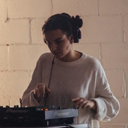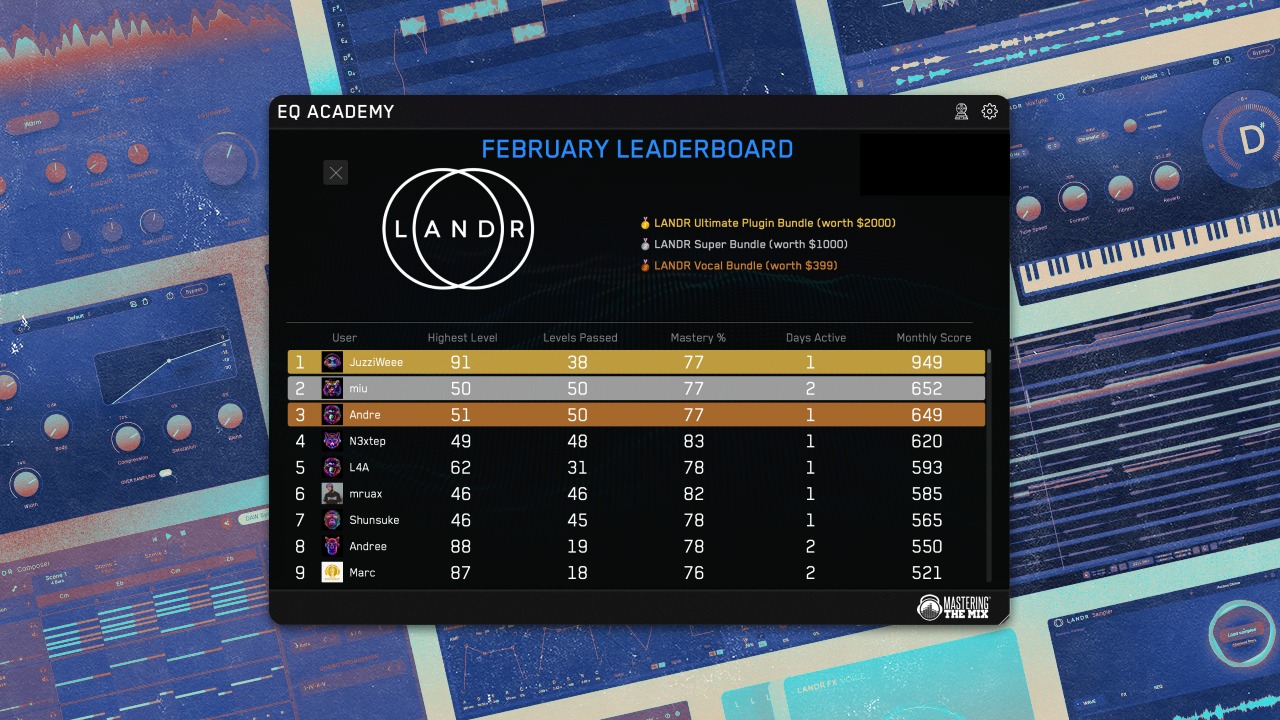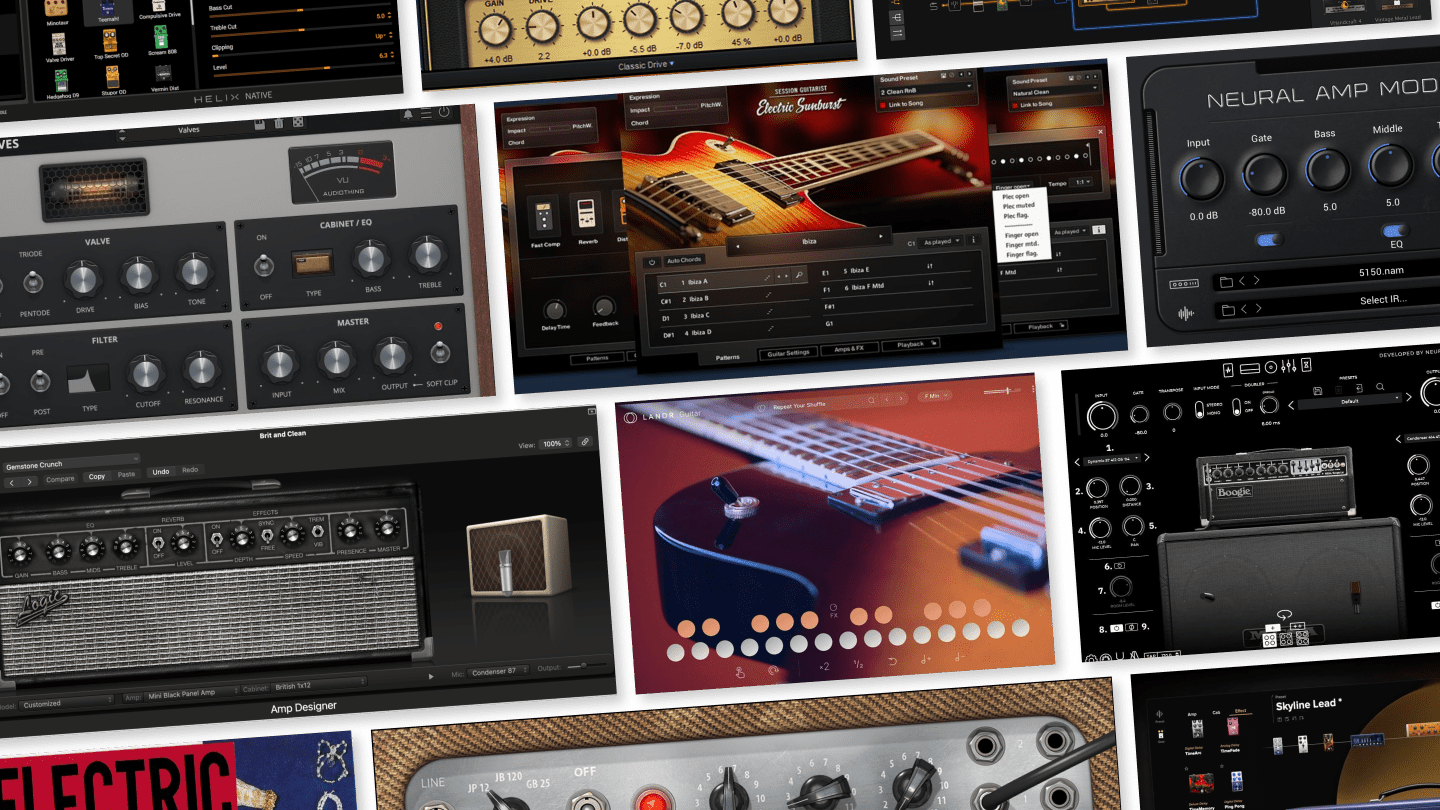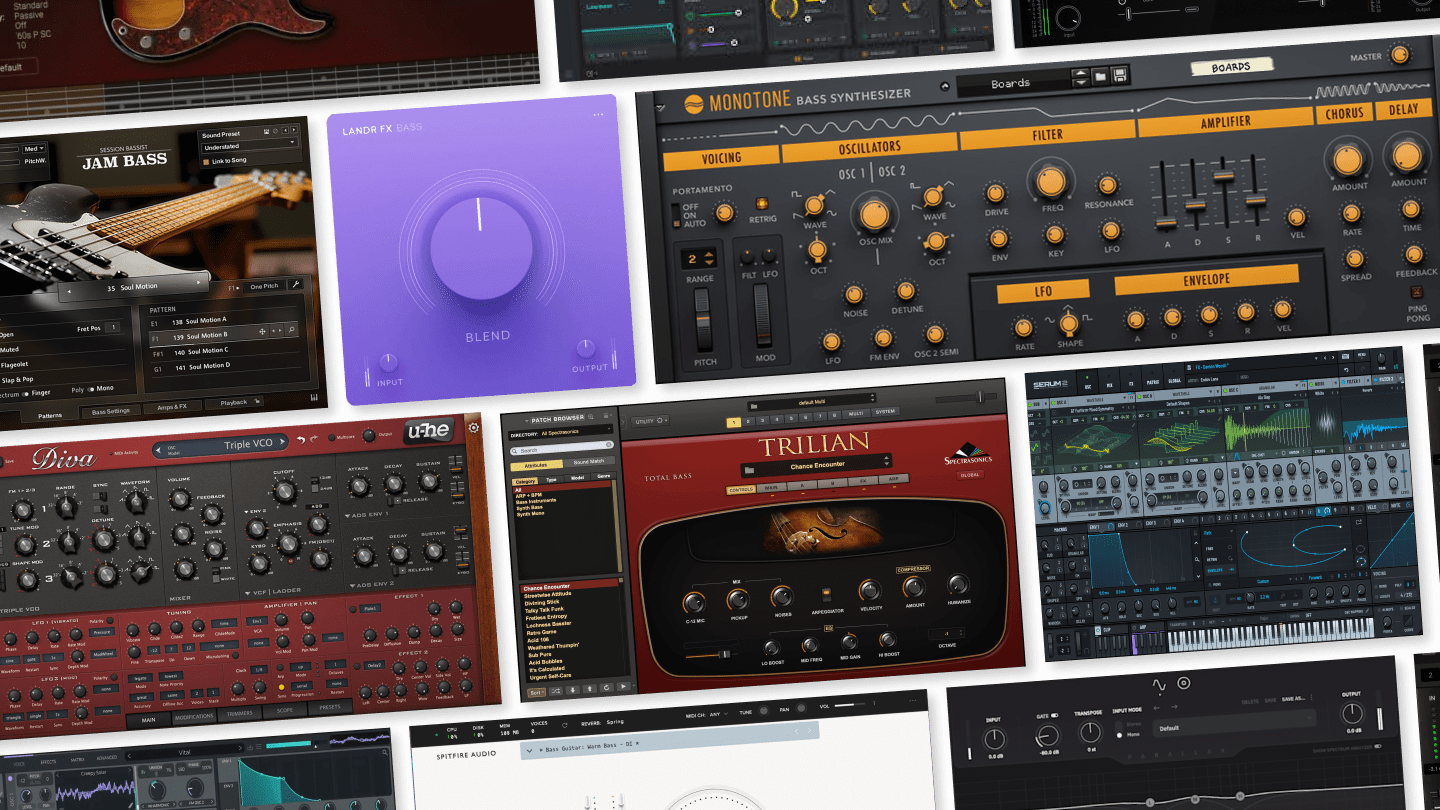
Pelada Is Political Music Between Acid Techno and Punk
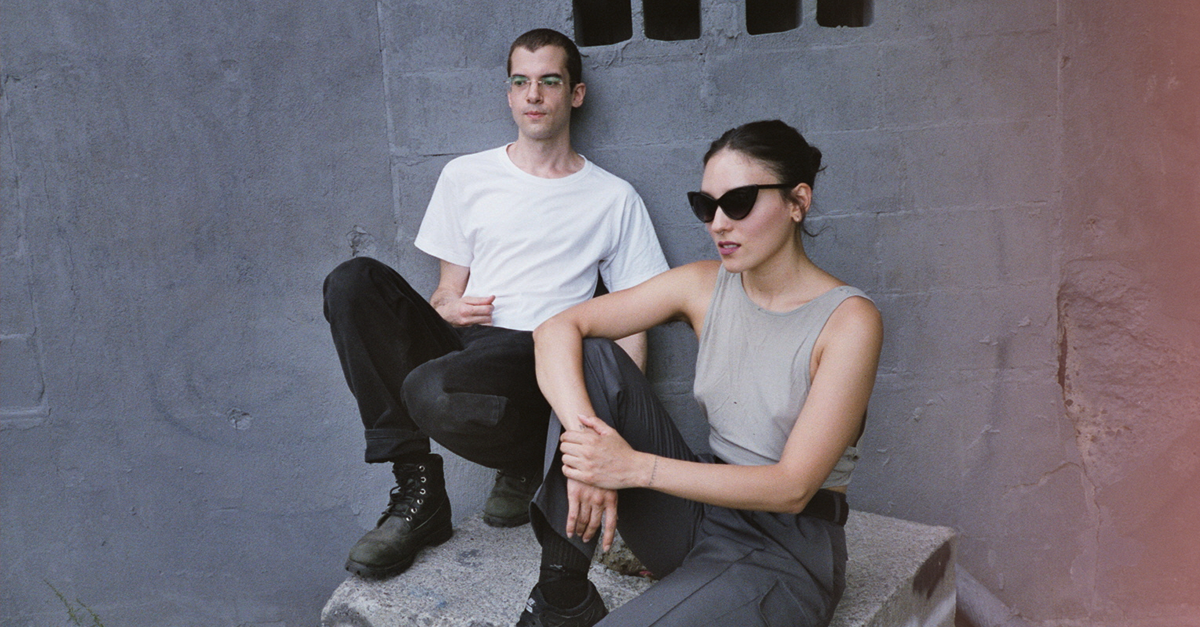
Attending a Pelada show is high-octane. Tobias Rochman produces an acidic techno backdrop to Chris Vargas’ punchy, powerful Spanish vocals.
Somewhere between 90s techno and punk with a clear penchant for the dancefloor, the Montreal duo has been a rising figure of the underground electronic scene of the city.
After seeing them play at sweaty raves, it’s clear to me that live performance is Pelada’s way of instantly connecting to the audience. Chris electrifies the crowd with her energetic screams and dance moves, while Tobias keeps the groove moving with his thundering, all-hardware percussion and synth lines (his setup includes a TR-707, SH-101 and TB-303).
It’s unusual to see live vocals at techno shows. When you think of lyrical music, techno is usually not at the top of the list—you might think pop, rock, rap, punk, or a number of other genres. That’s what makes Pelada stand out: you’re in the middle of the crowd dancing to banging techno, while also enjoying the rawness of live singing.
Even if you don’t decipher the meaning of the lyrics, the urgency is evident. Chris writes about surveillance, anger and oppression. Pelada is a call upon the crowd to both wake up and dance.
Dive into the fascinating universe of Pelada, whom we had the pleasure to chat with at MUTEK Montreal last August. We talked about their collaborative dynamic, Pelada’s unique take on vocals and more.
Leticia Trandafir: How did you guys meet and start collaborating?
Chris Vargas: We met a long time ago working at the same retail company, but we didn’t really become friends then. It wasn’t until a few years later when Tobias’ solo project ‘Tobias Rochman’ and my project played the same bill. Around that time I was getting more interested in electronic music — the more dance and fun side of it.
After seeing him play I was like, “I think it makes sense to talk to him and see if there’s a collaboration that could be done.” So I approached him and we agreed to meet up and talk about music and see what’s up. We played our first show at Slut Island festival and after that it really felt good to keep doing it.
L: What were your solo projects before you got together? What kind of musical backgrounds did you bring to the project?
C: My only musical background was drums when I was 14 or 15 — which I didn’t really keep up that much. Later I joined this project called Pelvic Floor with five other people — it still exists we just haven’t done anything in a long time. It’s an experimental industrial project with contact mics, metal and lots of electronic gear. So that’s very different from what I’m now used to doing with Tobias.
I think the magic of somebody seeing you live is that they don’t know your process and they don’t know how you arrive to those places.
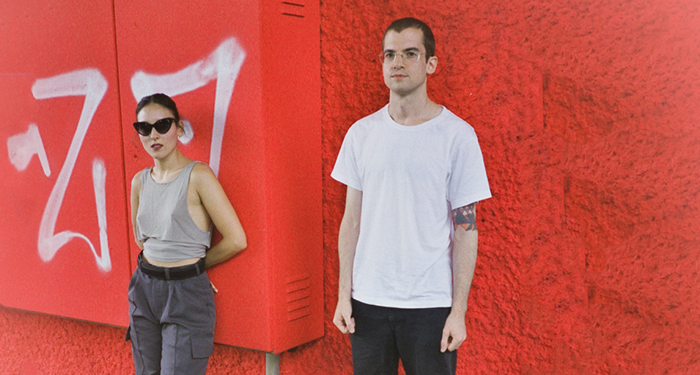
Tobias Rochman: I was playing synthesizer for the band Cosmetics on some of their tours. We went to the States a few times, and I was sort of an auxiliary satellite member. They gave me my first synthesizer and within a week we were on tour. I had little stickers over the keys so I could remember the notes.
Eventually, they moved back to Vancouver and I was left to my own devices. So when I started, I made music in a different style, but with the same working method because I didn’t understand any other sort of working methods. I didn’t know about MIDI or Control Voltage or any of that stuff back then. I started out trying to do everything, like a one-man band and it was a bit of a handful. Then over the last four years working with Chris, I’ve changed my technique quite a bit and learned a few tricks.
L: What deep musical influences do you carry with you?
T: I remember when I was a kid, my father used to teach a steps aerobics class at the YMCA. I would go with him because I didn’t have a babysitter. I would sit at the back on these mats reading “Silver Surfer” comics. He actually got a local DJ to mix these cassettes of house music. He worked in radio for many years, so he knew how to find a DJ and asked for dance music. They made him special mixes and then other instructors at the YMCA would wanna borrow his tapes. If you were the instructor with the freshest, most original house music you were the king! So he was very proud of that. And I remember just sitting at the back, watching. I think that a lot of experiences we have as children come back as adults. You wonder what the roots are of some of the things that you’re into — where they started, what the seed was.
I also remember in 2001, it was sort of the tail end of the original 90s rave scene. It was obviously into the 2000s, but there was a rave in Halifax. I remember going on a bus with the windows blacked out to this secret location. I was wearing a Sid and Nancy T-shirt and I was super punk at the time. I didn’t really know what I was seeing. I had a really great night but I’d never had any additional interest in house music, techno or drum’n’bass. Getting that little taste of it one summer night as a 14 year-old… I think about that. I’ve been thinking about that a lot.
After playing the songs every night, I have this impulse to deconstruct them or destroy them… So through the weeks of a tour the material tends to evolve.
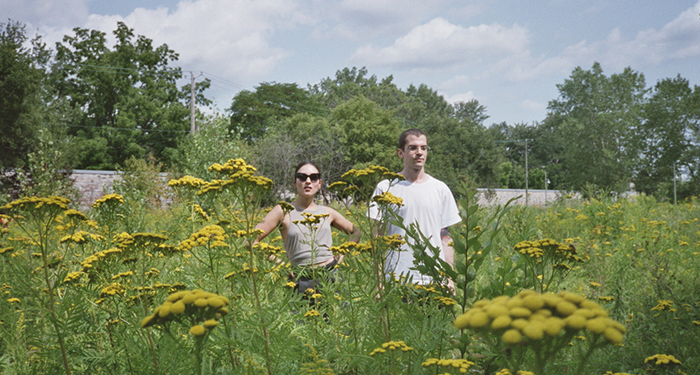
C: My dad wasn’t a very musical person, but my mom was. On weekends, it was chores day. So we all had to clean the house and do our rooms and stuff. But while we did that, she would blast the radio. Sometimes it would be a Colombian channel — so a lot of cumbia and salsa from the 90s that I grew up listening to. And then she’d switch it up to American music that she really liked: a lot of Tina Turner, Prince, Donna Summer — she was really obsessed with her.
So growing up, it’s always been music that talked about having a good time or celebrating life in some way. And especially with cumbia, it’s always a party, with a mix of sob stories and some misogynistic ways of talking about women… But music was always fun to listen to.
[adbutler zone_id=”291816″ secure=”1″ type=”asyncjs”]
And then when I was a teenager, I got into melancholic music and I was like:”This is music”! I also got into poetry and I wrote about sad things. I’m less into that now.
L: What’s the process and workflow when you produce a track together?
C: I think it starts with the music first.
T: There isn’t a set method. There’s some tracks that we’ve been playing for four years and there’s other tracks that we’ve been playing for four weeks. We take the songs on the road, and we tour pretty heavily. After playing the songs every night, I have this impulse to deconstruct them or destroy them if I’m playing the same set over and over again. So through the weeks of a tour the material tends to evolve.
And then when we get back, we go into the studio with Pierre Guerineau [of Essaie Pas] and he helps us add any technical flourishes that may be outside of our current knowledge base. We try to stay open-minded in terms of how a song will be formed. There’s no one correct way to arrive at the finished product. Sometimes we’ll work on the songs and keep changing them for years. Sometimes we’ll acquire new equipment and we’ll transpose all of the old music onto new equipment. And even in that process the timbre will change.
Performances and records are different kinds of platforms, they offer different things.
C: Also we sometimes leave room for spontaneity when we’re playing the songs — in case something needs to go on longer, etc. Last time, there was this song that we started writing, and then right before we played a set, Tobias mentioned that there was a new baseline that was gonna come in. I was like, “Oh, shit.” But it usually works out, we don’t leave each other hanging. And it was a really nice moment when that happened — it sounded good and it was really fun to sing to. So I think it’s important, that room to try things while we are doing it live.
T: I would only pull a move like that if I believed in the thing I was offering. I try not to make it happen. But occasionally, if I feel very passionately about something…
L: How do performing and recording inform each other in your work?
T: We’ve done it completely both ways. We’ve brought ideas into the studio and refined them there. We’ve also made things a 100% in the studio and then taken them out to perform live and tried to recreate them as honestly as we could. We really try to keep an open mind, like I said. If you find yourself stuck in one method of working, maybe your results become predictable. I think the magic of somebody seeing you live is that they don’t know your process and they don’t know how you arrive to those places. So really, it could be anything behind the scenes.
C: I’m actually finding it kind of confusing to understand the process of recording something that we’ve done live and delivering the same level of energy as we do live. There’s still a lot of yelling in it, but we’ve re-listened to some of the tracks and then realized that some things worked better in recording and not so much live or vice versa. Performances and records are different kinds of platforms, they offer different things. So I don’t know, it’s a new thing for us — or for me personally — to understand where we stand with both of those things because they’re really different. They offer different sort of identities.
L: Totally. Especially because your performance is so energetic and there’s such a ‘liveness’. You might sometimes wonder “How are we gonna put that in a recording?”
C: I think the recordings are still pretty energetic, but it’s a different mind space.
T: I don’t personally like the purist ideology. We try to work against that. I think debates like analog versus digital, or modular versus software are pretty outdated. And I’d like — at least with the art we make — to be confident living in the time that we live in, having the tools that we have. Anybody who is telling you that there’s one way to do it is a charlatan, basically.
L: Let’s talk about your lyrics. First of all, why did you choose Spanish as a language to write in?
C: I think writing lyrics in English would have been probably really easy, or a lot easier than it is for me to write in Spanish. I wanted to write in Spanish even though I didn’t have a clear idea as to how it would translate, or how it would come across live. It just so happened that I yell a lot, but I wasn’t sure that I was gonna do that from the get-go. I’ve now gotten really comfortable with it — it’s fitting to channel some aggression through Spanish. It sounds better to me to sing in Spanish.
Anybody who is telling you that there’s one way to do it is a charlatan, basically.
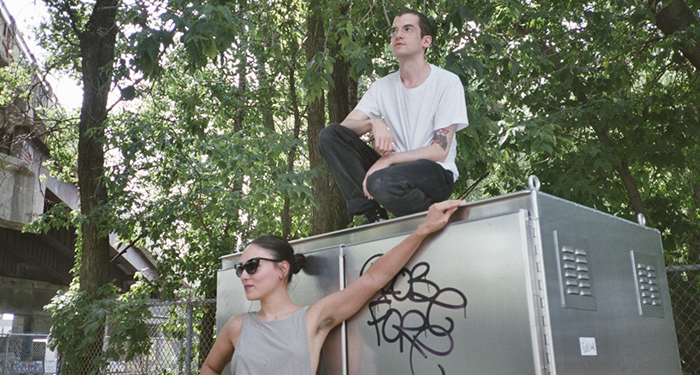
People have brought up that maybe writing in English would make the content more relatable, so that more people know what I’m saying. But I’m not sure that I’m catering necessarily to a marginalized audience, I wanna do right by the heritage that I was raised in. And I don’t speak enough Spanish outside of my immediate family so it was a good opportunity to dive into that.
L: What are some of the themes that you’re trying to convey in the lyrics?
C: I don’t know why I find this question difficult to answer… Writing in Spanish, and often performing to audience members who don’t all speak Spanish is a way to protect myself from how honest I like to be about some things perhaps. There’s a couple of songs that are personal, maybe even autobiographical.
I also try to talk about things Tobias and I talk about. Our music is a good platform to share some of the views that we both have. There’s one track, “Córrale” that is about how we traverse the internet and how few apps are encrypted. Your information is so personal and yet it’s hard to have a private conversation online. It’s hard to conceive that you’re not going to protect your identity wholeheartedly. That’s an issue I have personally, but it’s an issue that affects everyone.
I think it would be difficult to make completely apolitical music considering the climate we live in… Any art you create exists in that context whether you like it or not.
T: I think it would be difficult to make completely apolitical music considering the climate we live in. I think you have to have some serious blinders on to wanna present an apolitical message to people when all day long they’re hearing about fascism. Not to get into the role of the artist too much… but I think that to completely negate that would be almost disrespectful. Any art you create exists in that context whether you like it or not. So without being preachy, if we’re gonna make art in 2017, let’s take a bird’s eye view of history. Do you really wanna be only speaking about issues that are connected to your ego? Maybe you do and that’s fine, there’s no right or wrong way to do it. But it just seems like if you’re using anger and violence and channeling it while ignoring the world around you, that would be a misstep to me. That’s my take on it.
L: Let’s talk about your MUTEK performance, how you prepared for that, and what you’ve planned for it.
T: We’ve been playing this current set for about six months. We went to New York, Chicago and Philadelphia and some other places with it. It’s been heavily road tested. So we were thinking to ourselves: for once we have this set that is very well prepared, rehearsed, and practiced. So what can we do to make it better? One of the weak spots I’ve noticed — personally with my performance — is that, because we’re not using computers, there’s downtime between songs sometimes, which is okay. In a fun context, having those 10 seconds or 20 seconds of silence between songs actually allows people to clap. But in an electronic music context that would be like dead air. That would be like almost a mortal sin.
So what we’ve been trying to do with this set is take our existing road-tested set and try to make it as seamless as possible. We’re trying to almost blend together songs that we’ve written. So you might hear a melody from the next song coming over the beat. We’re trying to take inspiration from DJ sets to keep the momentum as strong as we possibly can. We feel confident in the content, so we’re asking ourselves: what else can we do to make the set even stronger? This has been our mission in the last month or two.
L: What are your upcoming plans for Pelada?
T: We’re headed to New York after MUTEK to play a show with Container and Via App at Sunnyvale. Then we’re gonna come back and go to Los Angeles to play a show with The Jesus & Mary Chain and Cold Cave.
C: That’s happening in October. It’s a festival called Cloak and Dagger.
T: It’s a good Goth festival where you must wear black.
Follow Pelada’s label NEW on SoundCloud, Bandcamp and Facebook. Follow Tobias on Twitter and Instagram.
Follow MUTEK Montreal on Facebook, Twitter, Instagram, Vimeo and SoundCloud.
Gear guides, tips, tutorials, inspiration and more—delivered weekly.
Keep up with the LANDR Blog.
